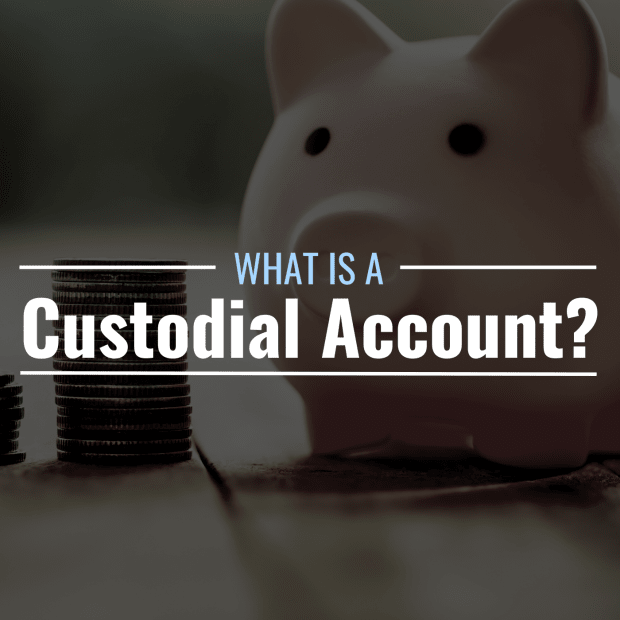
When you are thinking about saving for your child’s future, you may wonder what kind of account would work best. If you are looking for ease-of-use and flexibility, then a custodial account might be the right fit. Find out what a custodial account is and how it could benefit you.
What Is a Custodial Account?
As the name implies, a custodial account is a financial account that is in one person’s name but is controlled by another person. Traditionally, a custodial account refers to a managed account that an adult opens on behalf of a minor. Once the child is no longer a minor, the beneficiary assumes control of the account.
Many parents choose to open a custodial account for their children to save money for higher education. Another popular use for this type of account is teaching children about the basics of investing. Custodial accounts often come with tax benefits, which make them more attractive than a standard savings account.
However, the term “custodial account” can be used more broadly. It can also refer to any other account that someone controls on behalf of another. For example, a retirement account that a firm controls could be considered a custodial account.
Types of Custodial Accounts
If you are thinking of opening a custodial account for your child, it is important to open the right type of account for your specific financial situation and goals. These are the types of custodial accounts there are and which one might be right for you.
The Uniform Transfers to Minors Act Accounts
The Uniform Transfers to Minors Act accounts allow you to contribute any kind of asset to the account. This includes some assets you might not expect, such as real estate and artworks. There are no contribution limits for UTMA accounts, meaning that you have no cap on how much you can save for your child — regardless of income. Another benefit of a UTMA account is that transferring your assets to the minor is relatively simple, especially if the custodian should die before the minor comes of age. Most UTMA accounts consider “coming of age” to be age 21. Some states do not allow you to open UTMA accounts, so be sure to research local laws near you.
The Uniform Gift to Minors Act Accounts
The Uniform Gift to Minors Act (UGMA) accounts are a little less flexible than UTMA accounts in terms of what assets you can contribute to the account. Rather than being able to contribute almost any kind of asset to the account, UGMA accounts limit the assets to cash, different types of securities, and insurance policies. Higher-risk investments, like stock options, are not permitted. UGMA accounts consider the child an adult entitled to their assets at age 18. Unlike UTMA accounts, all states in the U.S. allow you to open UMGA accounts.
How a Custodial Account Works
Unlike opening a trust, opening a custodial account is simple. Most major brokerages offer the ability to open one of these accounts either in-person or online. You will need to provide personal information like your Social Security number, contact information, and personal address to open the account. Usually, the brokerage will also charge a fee when opening the account. Comparing fees can be helpful for determining which brokerage you want to select.
You must transfer your assets into the account once it is open. What kind of assets you can invest depends on what type of custodial account you decide to open. The custodian of the account—typically an investment manager at the brokerage—will decide how to invest those assets and grow the account. You can continue to contribute to the account as it is being managed.
Under certain circumstances, you may also withdraw from the account to cover expenses related to the beneficiary. Most accounts dictate that all custodial assets must be used "for the use and benefit of the minor." While this wording may seem vague, it means that you are not allowed to utilize the account’s assets for day-to-day expenses or any expenses that do not directly benefit the child. It is best to consult a financial advisor or another professional before utilizing the assets for an expense.
Once the custodial account’s beneficiary comes of age (also called “reaching majority”), they gain control of the account from the custodian. If the beneficiary dies before reaching the majority, the account will become part of their estate.
Advantages of Custodial Accounts
There are similar types of accounts that you can choose to fulfill the same purpose as a custodial account. However, custodial accounts come with several benefits that make them attractive to many parents. Here are the primary benefits:
No Limits
Custodial accounts have incredibly flexible rules and regulations, allowing them to be utilized with ease. There are no caps on income or contributions. You can also withdraw from the account without being penalized. This makes the custodial account a very low-maintenance way to open an account for your child.
Flexibility
Many people may establish a custodial account to serve as a kind of college fund. However, custodial accounts give the custodian the ability to withdraw funds for other purposes. Rather than being limited to paying for college expenses, a custodian can withdraw from the account for any expense that is "for the use and benefit of the minor."
Ease of Transfer
Unlike some other types of accounts, custodial accounts make it incredibly simple to transfer assets to the beneficiary. Once the beneficiary reaches the majority, they take control of the account. It is straightforward and does not require legal expertise to execute.
Tax Breaks
Children who file on their parents’ tax return can claim their custodial fund assets at a reduced tax rate. The beneficiary can do this until they turn 18 years old, or 24 years old if they are attending college.
Convenience
While a custodial account can accomplish many of the same goals as trust funds, custodial accounts are much easier to open, rather than undergoing the complex process of hiring a lawyer and deciding if you want to provide all of your assets upfront.
Disadvantages of Custodial Accounts
While custodial accounts can offer many benefits, they are not the perfect fit for everyone. They can have many disadvantages that, depending on your specific situation, might make other account options better for you. Here are the disadvantages of the custodial account:
Affects Financial Aid
While custodial accounts can be helpful for creating a college fund, custodial accounts can count against your child when it comes time to apply for financial aid. The custodial fund assets are counted toward overall income, potentially bumping your household income bracket.
Limited Tax Breaks
While the first $1,050 contributed to the account is tax-free, any contributions beyond that point can be taxed. The rates vary depending on the state you live in. You may be able to get better tax rates on other types of accounts.
Investment Limitations
Some types of custodial accounts provide a lot of flexibility around what kind of investments you can make. However, all custodial accounts won’t allow higher-risk investments.







